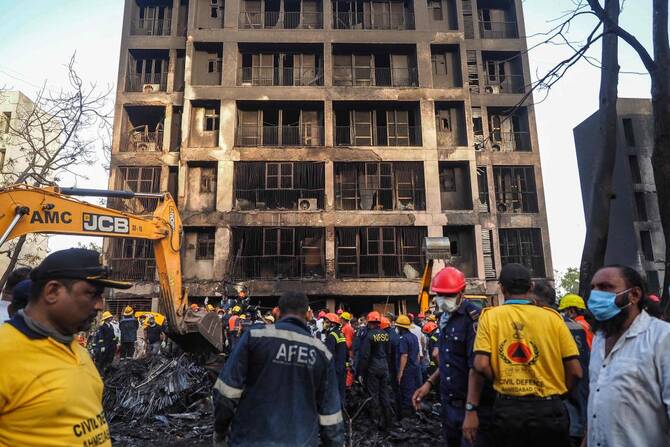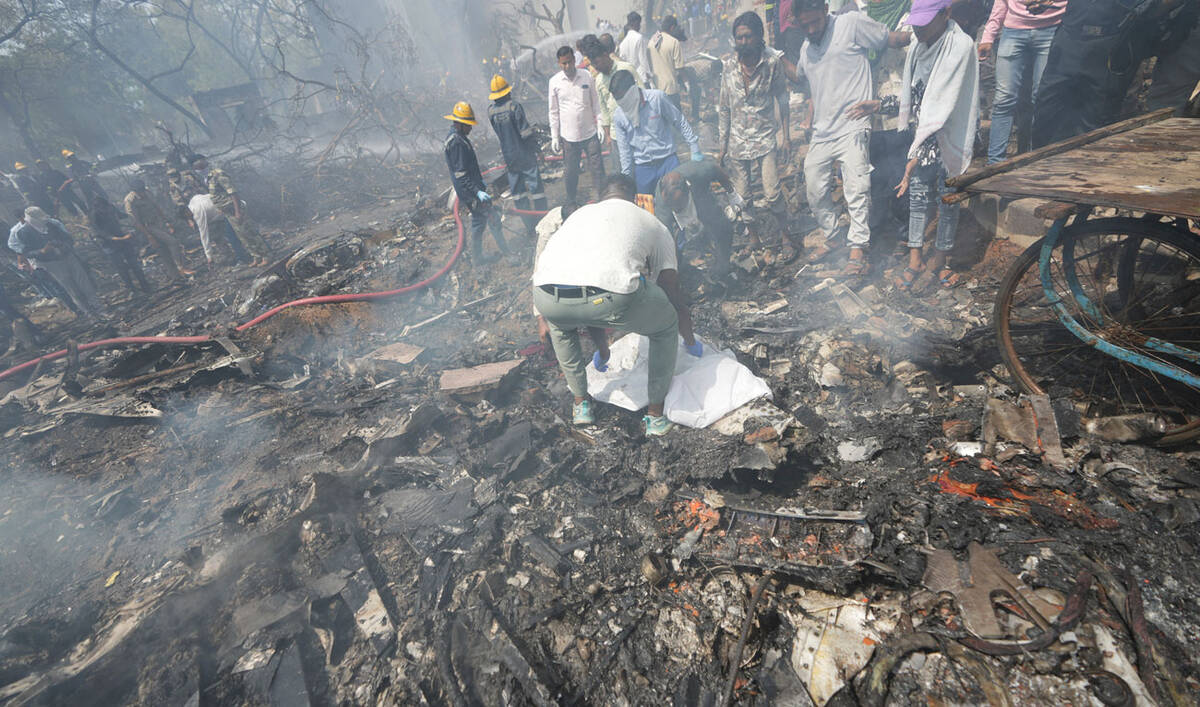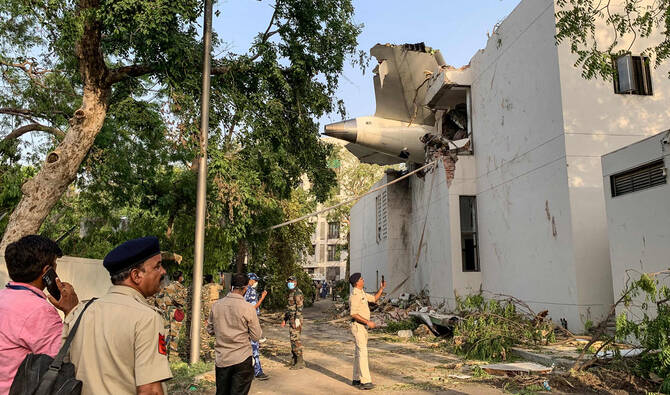KARACHI: Pakistani leaders and the country’s national carrier offered condolences on Thursday as more than 290 people were killed when an Air India plane with 242 people on board crashed minutes after taking off from the western city of Ahmedabad in the world’s worst aviation disaster in a decade.
The dead included people on the ground as the aircraft — headed for Gatwick Airport, south of the British capital — crashed on a medical college hostel during lunch hour.
At least one passenger is known to have survived the crash, police said.
“Saddened by the tragic crash of Air India flight near Ahmedabad today. We extend our condolences to the families of the victims grieving this immense loss,” Pakistani Prime Minister Shehbaz Sharif said on X.
“Our thoughts and prayers are with all those affected by this heartbreaking tragedy.”
PIA, Pakistan’s national carrier, said it stood in “solidarity with our fellow aviation community, offering our deepest condolences to Flight 171 and all those impacted.”
Bilawal Bhutto-Zardari, the head of a Pakistani delegation visiting world capitals to present Islamabad’s position on a recent military standoff with New Delhi, also expressed condolences over the Indian plane crash after his team arrived in Brussels to hold meetings.
“Saddened to hear a tragic incident occurred earlier today,” he said on X. “I express my profound condolences to the people of India.”
Vidhi Chaudhary, a top state police officer, told Reuters approximately 294 had died:
“This includes some students as the plane crashed on the building where they were staying.”
She said police found one survivor who was in seat 11A, next to an emergency exit, adding that there could be more survivors in hospital.

Indian media widely reported the survivor had been sitting in seat 11A, after videos shared on social media showed Vishwash Kumar Ramesh — in a bloodied t-shirt and limping, but walking toward an ambulance. (X/Screenshots)
“Thirty seconds after take-off, there was a loud noise and then the plane crashed,” 40-year-old survivor Ramesh Viswashkumar told the Hindustan Times, which showed a boarding pass for seat 11A in that name online.
“It all happened so quickly,” he told the paper from his hospital bed.
“When I got up, there were bodies all around me. I was scared. I stood up and ran. There were pieces of the plane all around me … Someone grabbed hold of me and put me in an ambulance and brought me to the hospital.”
He said that his brother, Ajay, was seated in a different row on the plane.
“He was traveling with me and I can’t find him anymore. Please help me find him,” he said.
FOREIGN NATIONALS ON BOARD
Ahmedabad police chief G.S. Malik said the bodies recovered could include both passengers and people killed on the ground. The dead included Vijay Rupani, the former chief minister of Gujarat state, of which Ahmedabad is the main city.
Relatives had been asked to give DNA samples to identify the dead, state health secretary Dhananjay Dwivedi told reporters.
Parts of the plane’s body were scattered around the smoldering building into which it crashed. The tail of the plane was stuck on top of the building.
The passengers included 217 adults, 11 children and two infants, Reuters reported. Air India said 169 were Indian nationals, 53 were Britons, seven Portuguese, and one Canadian.
Aviation tracking site Flightradar24 said the plane was a Boeing 787-8 Dreamliner, one of the most modern passenger aircraft in service.
It was the first crash for the Dreamliner, which began flying commercially in 2011, according to the Aviation Safety Network database. The plane that crashed on Thursday flew for the first time in 2013 and was delivered to Air India in January 2014, Flightradar24 said.
CRASH JUST AFTER TAKE-OFF
Thursday’s crash occurred just after the plane took off. TV channels showed the plane taking off over a residential area and then disappearing from the screen before a huge fireball could be seen rising into the sky from beyond the houses.
“My sister-in-law was going to London. Within an hour, I got news that the plane had crashed,” Poonam Patel, a relative of one of the passengers, told news agency ANI at the government hospital in Ahmedabad.
Ramila, the mother of a student at the medical college, told ANI her son had gone to the hostel for his lunch break when the plane crashed.
“My son is safe, and I have spoken to him. He jumped from the second floor, so he suffered some injuries,” she said.
According to air traffic control at Ahmedabad Airport, the aircraft departed at 139 p.m (0809 GMT). It gave a Mayday call, signaling an emergency, but thereafter there was no response from the aircraft.
US aerospace safety consultant Anthony Brickhouse said one problematic sign from videos of the aircraft was that the landing gear was down at a phase of flight when it would typically be up.

Rescue officials work at the site where Air India flight 171 crashed in a residential area near the airport in Ahmedabad on June 12, 2025. (AFP)
“If you didn’t know what was happening, you would think that plane was on approach to a runway,” Brickhouse said.
Boeing said it was in contact with Air India and working to gather more information. Boeing shares fell 5 percent as the crash posed a major setback for the plane maker as its new CEO looks to rebuild trust following a series of safety and production challenges.
Aircraft engine-maker GE Aerospace said that it would put a team together to go to India and analyze cockpit data, India’s CNBC TV18 reported.
The US National Transportation Safety Board said it would lead a team of US investigators traveling to India to help in the investigation.
Britain was working with Indian authorities to urgently establish the facts around the crash and to provide support to those involved, the country’s foreign office said.
“The tragedy in Ahmedabad has stunned and saddened us,” Indian Prime Minister Narendra Modi posted on X. “It is heartbreaking beyond words.” Gujarat is Modi’s home state.
British Prime Minister Keir Starmer said images emerging of the crash were “devastating.”
A Buckingham Palace spokesperson said King Charles was also being kept updated.
INDIA’S FIRST CRASH SINCE 2020
Ahmedabad Airport, which suspended all flight operations after the crash, said it was operational again but with limited flights. The airport is operated by India’s Adani Group conglomerate.

Rescuers work at the site of an airplane that crashed in India's northwestern city of Ahmedabad in Gujarat state on June 12, 2025. (AP)
The last fatal plane crash in India, the world’s third largest aviation market and its fastest growing, was in 2020 and involved Air India Express, the airline’s low-cost arm.
The airline’s Boeing-737 overshot a “table-top” runway in southern India, skidded and plunged into a valley, crashing nose-first into the ground and killing 21 people.
The formerly state-owned Air India was taken over by Indian conglomerate Tata Group in 2022, and merged with Vistara — a joint venture between the group and Singapore Airlines – in 2024.
DEADLY CIVILIAN CRASHES OVER THE DECADES
AUGUST 2020
Twenty-one people died when an Air India Express Boeing 737 plane skidded off the runway in the southern city of Kozhikode during heavy rain, plunged into a valley and crashed nose-first into the ground.
MAY 2010
An Air India Boeing 737 flight from Dubai overshot the runway at the airport in the southern city of Mangaluru and crashed into a gorge, killing 158 people on board.
JULY 2000
More than 50 people were killed when a state-owned Alliance Air flight between Kolkata and the capital, New Delhi, crashed in a residential area of the eastern city of Patna.
APRIL 1993
An Indian Airlines Boeing 737 crashed during takeoff in the western city of Aurangabad and killed 55 people on board.
AUGUST 1991
An Indian Airlines Boeing 737 flight from Kolkata crashed during descent near Imphal, the capital of the hilly north-eastern state of Manipur, killing all 69 occupants onboard.
OCTOBER 1988
More than 130 passengers died when an Indian Airlines Boeing 737, flying from Mumbai to Ahmedabad, crashed as it was coming in to land.
JANUARY 1978
All 213 passengers of an Air India flight were killed when the captain lost control of the plane after take-off and plunged it into the Arabian Sea off the coast of Mumbai, India’s financial hub.
With inputs from Reuters














